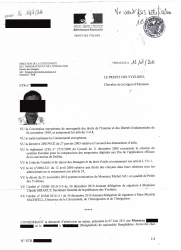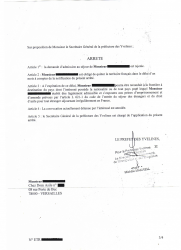Persons affected by the OQTF
Non-EU nationals (countries outside the EU)
– A person who cannot prove that he or she has entered France legally and has remained in the country without a residence permit;
– A person who has remained in France beyond the validity of his or her visa or, if he or she is not required to have a visa, remained in France beyond the expiry of a period of three months from the date of his or her entry into France;
– A person who has been refused a residence permit or its renewal;
– A person who has been definitively refused refugee status or subsidiary protection, or whose right to remain on French territory has been terminated;
– A person whose behavior represents a threat to public order and who has been residing in France for less than three months;
– A person working without authorization and who has been residing in France for less than three months.
Non-EU nationals (countries outside the EU)
A European person may be subjected to this decision in the following cases:
– His or her stay represents an “abuse of rights”
– His or her presence constitutes a “real, present and sufficiently serious threat” to the society.
Protected individuals?
Before the introduction of the January 26, 2024 law, several categories of people were protected against OQTFs (e.g. foreign nationals in France for more than 20 years, spouses of French nationals, etc.). The January 26, 2024 law abolished these protected categories, except for minors.
Any foreigner of legal age can therefore be issued with an OQTF, regardless of their personal situation (marriage, length of time in France, etc.).
What happens in the case of an Asylum application?
As a principle, an asylum seeker has the right to remain in France until his or her asylum application has been definitively rejected (until the CNDA has reached a decision).
However, there are exceptions in which asylum seekers whose applications have been rejected at first instance (by OFPRA) may be issued with an OQTF :
– Inadmissible asylum application (for example, if the OFPRA considers that the person benefits from protection in another EU member state);
– Decision to close the case;
– Withdrawal of the asylum application;
– Extradition decision;
– Person from a “safe” third country
– Person subject to expulsion or ban from French territory;
– Request for reconsideration deemed inadmissible;
>A significant number of people may therefore be subject to an OQTF and deported even though the CNDA has not yet ruled on their appeal.


OQTF Categories, Appeal Procedures and Deadlines
f you wish to object the OQTF, you can file an appeal with the administrative court. The time allowed for lodging an appeal varies from one procedure to another:
| NORMAL Procedure
OQTF (refusal of residence + with deadline for voluntary departure) 30 days
30-day period for appeal
|
SPECIAL Procedure
OQTF and house arrest .
7-days period for appeal
|
PRIORITY Procedure
OQTF issued with detention in administrative custody
48h for appeal |


